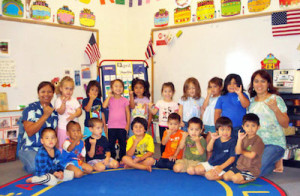Finding a Good Preschool
 School readiness is the first of the National Education Goals and includes the objective that all children will have access to high-quality preschool programs to help prepare them for the next level of schooling. The Goals also acknowledge the value of parental participation in promoting the social, emotional, and academic growth of children. A vital role for parents lies in the careful selection of a preschool to ensure that the program gives your child the right start.
School readiness is the first of the National Education Goals and includes the objective that all children will have access to high-quality preschool programs to help prepare them for the next level of schooling. The Goals also acknowledge the value of parental participation in promoting the social, emotional, and academic growth of children. A vital role for parents lies in the careful selection of a preschool to ensure that the program gives your child the right start.
Many different types of agencies around the country operate preschool programs in a variety of settings. Some programs are operated by local schools. Some, like Head Start and migrant programs, are sponsored by federal agencies, and others are run by nonprofit groups such as churches and charitable organizations. Some are provided by employers while others are owned by individuals or franchise chains. The quality of the preschool varies from program to program.
As a parent, you will want to assess how well a preschool program will satisfy your needs and preferences. When looking for a preschool, you can start by contacting a local child care resource and referral agency.
When you choose a preschool program, it is important to consider the characteristics of your child, the program, and the preschool staff; as well as the preschool’s physical environment; and which combination of these factors would provide the best experience for your child.
The directors of good programs usually encourage parents looking for a preschool to visit at any time with their children, but calling ahead for an appointment is a courtesy to the staff and will ensure that the director has time to talk with you. Parents should visit as many preschools as possible before making a choice. If you are making such a visit, give yourself time to get a feeling for the classroom’s general atmosphere and the extent to which children appear comfortable and involved. A good educational and organizational climate is usually indicated by friendliness among the staff and children.
Children in a good preschool are usually not easily distracted by visitors and continue to be absorbed in their work or play. When children rush toward visitors and stay close to them, abandoning their activities, it very likely indicates that the activities do not stimulate or interest the children enough.
You can ask the following questions about the preschool:
Does the program have a clear written statement of its goals and philosophy?
Do the goals address all areas of a child’s development, including his or her social, emotional, intellectual, and physical development?
Does the preschool offer a balance of individual, small-group, and large-group activities; and spontaneous play and teacher-guided activities?
Is there a balance between rest and quiet periods and vigorous outdoor activities?
Do the preschool’s activities encourage self-expression; help children to develop various motor skills; and regularly expose the children to literature, the language arts, music, science, and nature?
Do the staff encourage and respond to children’s natural interests in reading, writing, and counting?
Does the preschool provide snacks and meals that are sufficiently nutritious?
Do the staff pay attention to, and follow up on, the children’s interests in the world around them?
Do the content and materials of the preschool program reflect cultural diversity and nonsexist attitudes?
Most preschool programs must conform to state regulations and satisfy minimum standards of health and safety. Even so, it is a good idea to ask the staff whether the program is up to date with its state license and is accredited by the National Association for the Education of Young Children. Studies suggest that preschools are more likely to offer high-quality programs when the number of children is small enough to allow the staff to get to know all the children and their families. Whenever possible, it is helpful to speak to other parents who have children in the program about their experiences and recommendations.




